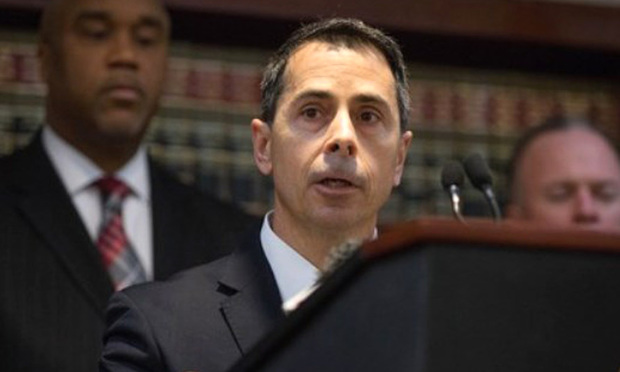As Cyberattacks on Business Grow, General Counsel Are 'Thirsty' for More Details
The rate of cyber-related suspicious activity reports has grown to nearly 80,000 per year, according to the director of the Financial Crimes Enforcement Network in the U.S. Treasury Department. That number includes 13,500 reports per year on suspicious business email alone, up 95% from 2016.
June 14, 2019 at 04:39 PM
5 minute read
The original version of this story was published on Corporate Counsel
 Kenneth Blanco, director of the Financial Crimes Enforcement Network. Courtesy photo
Kenneth Blanco, director of the Financial Crimes Enforcement Network. Courtesy photo
The rate of cyber-related suspicious activity reports has grown to nearly 80,000 per year, according to Kenneth Blanco, director of the Financial Crimes Enforcement Network in the U.S. Treasury Department.
That number includes 13,500 reports per year on suspicious business email alone, up 95% from 2016. Phishing and other email schemes “are among the growing trend of cyber-enabled crime adversely affecting financial institutions, their customers, and others, which is estimated to have resulted in losses of more than $12.5 billion since 2013,” Blanco said in a June 12 speech at New York University Law School.
Laurel Rimon, senior counsel at O'Melveny & Myers in Washington, D.C., who focuses on cyber and white-collar crime, attended the speech. After serving 15 years with the Department of Justice and as an assistant U.S. attorney, Rimon served as general counsel of the office of inspector general for the U.S. Department of Homeland Security from 2015 to 2018, and as assistant deputy director of enforcement at the Consumer Financial Protection Bureau for three years before that.
She said she thinks the significant increase in reported activity is due to a combination of factors, including “the exponential explosion of these events in general,” as well as companies increasing their monitoring to detect events.
Another factor in the increase, Rimon said, is companies feel reporting is required after a 2016 federal advisory that says, “With respect to e-mail-compromise fraud, a financial institution may have a [report] filing obligation regardless of whether the scheme or involved transactions were successful, and regardless of whether the financial institution or its customers incurred an actual loss.”
Rimon said she “talks regularly with general counsel and chief compliance officers about these issues,” and one area she thinks can be improved is the sharing of information within an organization.
“Sharing information is always a challenge,” she said, “but there is a much stronger emphasis now on making sure different silos in the business are talking to one another.” She said the role of compliance is to force that information sharing to happen where it needs to.
Michael Zweiback, a partner and co-founder at boutique white-collar and cybersecurity law firm Zweiback Fiset & Coleman, said he advises in-house counsel that sometimes the simplest techniques can be the best.
“The old analog method of picking up the phone and actually verifying a transaction over a certain dollar amount” needs to be done, he said. Zweiback formerly served as an assistant U.S. attorney in central California and was chief of its cyber and intellectual property crimes section.
“General counsel need to look at patterns of behavior of their own personnel, and make sure they are not doing the easiest and most efficient thing electronically, while not actually talking to one another,” he advised.
He said in-house counsel also need to “make friends” with the local office of the FBI. “The FBI has the expertise and has had good success in retrieving these wire transfers [based on deceptions],” he said. “But the key is time. They must be able to jump on it immediately.”
Both Rimon and Zweiback said the government also needs to be doing a better job of reaching out to businesses and helping them understand how attacks happen and how they can better prepare internally.
When it comes to suspicious activity reports, Rimon said, “the greatest frustration on the part of financial organizations is that it's a one-way street.” She said every company wants more information on the nature and types of attacks and how to avoid them.
“I worked in government, so I understand that it's not in the business of reporting back. But with financial transactions, the government should be providing more information and analysis on what it's seeing in the reports so companies can attune their processes to be more meaningful.”
For the government's part, Blanco closed his speech by noting ongoing efforts to upgrade and modernize the reporting system and to enhance his agency's engagement with the financial sector.
He said he wants to “incorporate the innovative approaches being taken by financial institutions and others, in order to have the best and most actionable information available.”
Rimon would welcome it if it means more sharing. She said that “general counsel and compliance folks continue to be thirsty for more details” about how they can develop compliance programs in ways the government will appreciate and that will also be more efficient for the institutions.
“I feel strongest about that point,” Rimon said. “It is very frustrating for companies dedicated to compliance and who really want to provide meaningful information, when they are kept in the dark about what the government is aware of. They need more insight.”
This content has been archived. It is available through our partners, LexisNexis® and Bloomberg Law.
To view this content, please continue to their sites.
Not a Lexis Subscriber?
Subscribe Now
Not a Bloomberg Law Subscriber?
Subscribe Now
NOT FOR REPRINT
© 2025 ALM Global, LLC, All Rights Reserved. Request academic re-use from www.copyright.com. All other uses, submit a request to [email protected]. For more information visit Asset & Logo Licensing.
You Might Like
View All
'Knowledge of Mismatch:' Fed Judge Offers Guidance on How to Hold Banks Accountable for Erroneous Transfers

'Reverse Robin Hood': Capital One Swarmed With Class Actions Alleging Theft of Influencer Commissions in January

SEC Official Hints at More Restraint With Industry Bars, Less With Wells Meetings
4 minute readTrending Stories
- 1Public Notices/Calendars
- 2Wednesday Newspaper
- 3Decision of the Day: Qui Tam Relators Do Not Plausibly Claim Firm Avoided Tax Obligations Through Visa Applications, Circuit Finds
- 4Judicial Ethics Opinion 24-116
- 5Big Law Firms Sheppard Mullin, Morgan Lewis and Baker Botts Add Partners in Houston
Who Got The Work
J. Brugh Lower of Gibbons has entered an appearance for industrial equipment supplier Devco Corporation in a pending trademark infringement lawsuit. The suit, accusing the defendant of selling knock-off Graco products, was filed Dec. 18 in New Jersey District Court by Rivkin Radler on behalf of Graco Inc. and Graco Minnesota. The case, assigned to U.S. District Judge Zahid N. Quraishi, is 3:24-cv-11294, Graco Inc. et al v. Devco Corporation.
Who Got The Work
Rebecca Maller-Stein and Kent A. Yalowitz of Arnold & Porter Kaye Scholer have entered their appearances for Hanaco Venture Capital and its executives, Lior Prosor and David Frankel, in a pending securities lawsuit. The action, filed on Dec. 24 in New York Southern District Court by Zell, Aron & Co. on behalf of Goldeneye Advisors, accuses the defendants of negligently and fraudulently managing the plaintiff's $1 million investment. The case, assigned to U.S. District Judge Vernon S. Broderick, is 1:24-cv-09918, Goldeneye Advisors, LLC v. Hanaco Venture Capital, Ltd. et al.
Who Got The Work
Attorneys from A&O Shearman has stepped in as defense counsel for Toronto-Dominion Bank and other defendants in a pending securities class action. The suit, filed Dec. 11 in New York Southern District Court by Bleichmar Fonti & Auld, accuses the defendants of concealing the bank's 'pervasive' deficiencies in regards to its compliance with the Bank Secrecy Act and the quality of its anti-money laundering controls. The case, assigned to U.S. District Judge Arun Subramanian, is 1:24-cv-09445, Gonzalez v. The Toronto-Dominion Bank et al.
Who Got The Work
Crown Castle International, a Pennsylvania company providing shared communications infrastructure, has turned to Luke D. Wolf of Gordon Rees Scully Mansukhani to fend off a pending breach-of-contract lawsuit. The court action, filed Nov. 25 in Michigan Eastern District Court by Hooper Hathaway PC on behalf of The Town Residences LLC, accuses Crown Castle of failing to transfer approximately $30,000 in utility payments from T-Mobile in breach of a roof-top lease and assignment agreement. The case, assigned to U.S. District Judge Susan K. Declercq, is 2:24-cv-13131, The Town Residences LLC v. T-Mobile US, Inc. et al.
Who Got The Work
Wilfred P. Coronato and Daniel M. Schwartz of McCarter & English have stepped in as defense counsel to Electrolux Home Products Inc. in a pending product liability lawsuit. The court action, filed Nov. 26 in New York Eastern District Court by Poulos Lopiccolo PC and Nagel Rice LLP on behalf of David Stern, alleges that the defendant's refrigerators’ drawers and shelving repeatedly break and fall apart within months after purchase. The case, assigned to U.S. District Judge Joan M. Azrack, is 2:24-cv-08204, Stern v. Electrolux Home Products, Inc.
Featured Firms
Law Offices of Gary Martin Hays & Associates, P.C.
(470) 294-1674
Law Offices of Mark E. Salomone
(857) 444-6468
Smith & Hassler
(713) 739-1250









